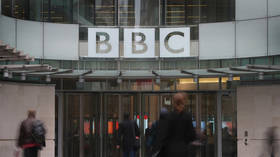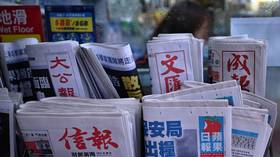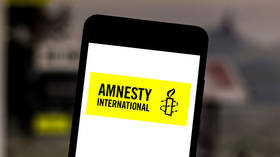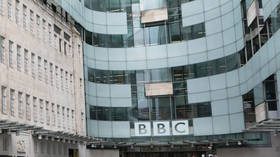I’ve spent months analyzing the BBC’s coverage of China. The results are revealing

The British Broadcasting Corporation (BBC) describes itself as “the most trusted broadcaster in the world.” That's quite a confident assertion to make about oneself. At first glance, such a label may seem appropriate to some. The BBC is, at least objectively speaking, a pioneering institution that shaped the world of modern reporting from the early 20th century onwards. It represents a style that is both authentic and classic, embodied by that formal British accent that is a hallmark of its reporting.
The BBC has undeniably been popular as a source of news, entertainment, and educational material for many around the world. Every other international broadcaster is, in some ways, a carbon copy of the principles and norms that the BBC established.
But that does not mean it is an institution without an agenda, however much it repeatedly seeks to deny this. Hiding behind its self-appointed reputation of impartiality, the BBC actually has a global mission to serve the goals of the British elite. It is a prolific, ideological, and aggressive foreign policy actor behind its elitist institutionalist culture, advocating an intellectual, moral, and value-based supremacy on behalf of the West.
This has never been more clearly demonstrated than with the broadcaster's unrelenting role in waging a propaganda war against China, serving the purposes of its masters in Westminster and Washington. I have spent a long time analyzing all the BBC’s output on China over the past few years – and the results are revealing, if not, sadly, surprising. It shows it to be an organization hellbent on fermenting geopolitical tensions, and calls into question the principles the BBC claims to base itself on, and exposes as a lie the historically entrenched reputation that it clings to.
A lingering attachment to Empire
The BBC claims to be an independent and impartial institution. However, an immediate look at its history and development show this isn't true. The BBC's elitist outlook is inseparable from its origin as an institution which was set up to facilitate the British Empire, and used as a vehicle for the government's messaging during a time where the British Empire itself was facing terminal decline in the 1950s.
The institution cannot be separated from the geopolitical precedents that shaped it, including World War II and the Cold War. As Gary D. Rawnsley explores in ‘Radio Diplomacy and Propaganda: The BBC and VOA in International Politics’, a 1946 white paper on broadcasting set out that the BBC would be subject to jurisdiction by the Foreign Office over certain policies, countries of interest, languages of focus, and other objectives.
These constraints have always jarred with the BBC's stated principles, with the British establishment repeatedly putting pressure on it to fulfill the government’s narratives. A key historical turning point in this area was the 1956 Suez Crisis and the handling of anti-Western, left leaning nationalist movements in former imperial domains throughout the 1950s and 1960s. There is little doubt that the broadcaster is tied to the fulcrum of ideological struggle under a mantra described as the “lingering attachment to an empire.” In the following decades, the BBC would also strictly adhere to the British government's line on the troubles in Northern Ireland, the Falklands War, and Iraq. While the BBC elevates itself over what is described as ‘state-affiliated media’ in other countries, as an ultimately superior institution for all intents and purposes, it is the same thing.
The (anti) China agenda
So it should come as no surprise that the BBC is not committed to impartial reporting on the matter of China, particularly as geopolitical tensions have increased over the past couple of years, but is actively peddling a narrative aimed at targeting the country in an aggressive fashion.
The broadcaster has been accused of this multiple times, not least by people in China, but dismisses these claims by asserting that it is impartial and that it has a monopoly over what constitutes the truth. To check on these claims, after years of frustration at what I see as often deliberately negative, unbalanced, and aggressive coverage, I decided to carry out extensive research of the BBC’s output on China.
This research has involved taking an inventory of hundreds and thousands of BBC articles online across the scope of several years, and organizing the data into findings. What was discovered is that on certain controversial issues pertaining to China, the BBC has been absolutely relentless. In 2021, for example, the BBC published in English at least 51 articles on the Xinjiang autonomous region and the ‘Uyghur Genocide’, amounting to nearly one a week. Even more strikingly, they published more than 100 articles criticizing and attacking the National Security Law in Hong Kong. In both instances, the articles were not balanced at all, but almost all exclusively pushed one point of view. The BBC’s bias is clear from a piece publicizing an Amnesty International report, which reads: ‘China has created a dystopian hellscape in Xinjiang’. It's worth noting that the BBC has amplified Amnesty reports against China on several occasions, but does not do this, for example, when it comes to Israel. More than 10% of the BBC’s headlines on Xinjiang topics contained the word ‘genocide’, when there is no evidence that one is or has taken place there.
What is more revealing is how the Xinjiang related content was organized throughout the year, and the themes it covered. From January to March of 2021, the BBC frontloaded Xinjiang articles very aggressively in line with the Biden administration coming into office, and seemingly mirroring the build-up of coordinated sanctions with the UK, Canada, and the EU. This included such headlines as, ‘Their goal is to destroy everyone: Uighur camp detainees allege systematic rape’ and ‘Uighurs: 'Credible case' China carrying out genocide’. Many of these stories are atrocity focused and emotionally charged, with no counter argument offered. In the next quarter (April-June, 2021) the BBC changed tone and began frontloading forced labor stories, including ones which indiscriminately attacked many businesses on baseless claims. This also followed the Biden policy agenda at that time.
Then, inexplicably, Xinjiang dropped off the BBC's coverage altogether. There were no articles on the matter throughout July to October. In November, however, the topic reappeared and has since aggressively accelerated in scope, coinciding with the run-up to this month’s Winter Olympics in Beijing and Washington’s push for a diplomatic boycott of it. The BBC also ran 24 stories on the ‘missing’ Chinese tennis player Peng Shuai in the space of a few weeks, using the BBC Sport division to push political messaging on this issue, as well as on Xinjiang. Whether by design or by choice, the BBC was complicit in coordinating coverage promoting an Olympics boycott.
The BBC's choice of experts on China over the past few years has also been highly problematic, with the broadcaster repeatedly citing partial sources often associated with US institutions, and failing to disclose their conflicts of interest. These include citations from the Australian Strategic Policy Institute (ASPI), a group funded by the US defense department and the arms industry, Victims of Communism researcher Adrian Zenz, or on Hong Kong, the astroturfing dissident figures, such as Jimmy Lai. If there is any particular group or organization that publishes a report critical of China, the BBC always gives it maximum publicity, while this platform is not offered on any other issue.
Whilst my research only scratches the surface of the BBC's anti-China agenda, it provides an important insight into what are unusual patterns and behaviors from the broadcaster in regards to the country. This encompasses: overreporting on certain topics; atrocity-driven emotional headlines and content with a slant to only one point of view; a total absence of the other side of the argument; a continual use of sources from agenda-driven institutions without disclosure or balance; identifiable patterns in the output of reporting that conveniently overlap with certain foreign policy developments or objectives of London and Washington; abuse of non-political mediums such as BBC Sport to push certain points.
There is a lot more analysis to be done on the BBC’s partiality on all matters Chinese, but nonetheless if it wasn't clear there was an agenda at play, it is now. The self-proclaimed ‘world’s most trusted broadcaster’ cannot be trusted at all.
The statements, views and opinions expressed in this column are solely those of the author and do not necessarily represent those of RT.

















